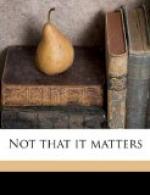Did she kill her husband? Did she and Robert kill him together? Or did she only hasten his death by her neglect of him in some illness? Did she dare him to ride some devil of a horse which she knew he could not master; did she taunt him into some foolhardy feat; or did she deliberately kill him—with or without her lover’s aid? I cannot guess, but of this I am certain. His death was on her conscience. Directly or indirectly she was responsible for it —or, at any rate, felt herself responsible for it. But she would not think of it too closely; she had room for only one thought in her mind. She was mistress of Littlehaw Manor now, and free to marry whom she wished. Free, at last, to marry Robert. Whatever had been done had been worth doing for that.
So she married him. And then—so I read the story—she discovered the truth. Robert had never loved her. He had wanted to marry the rich Miss Field, that was all. Still more, he had wanted to marry the rich Mrs. Meadowes. He was quite callous about it. She might as well know the truth now as later. It would save trouble in the future, if she knew.
So Mary killed herself. She had murdered John for nothing. Whatever her responsibility for John’s death, in the bitterness of that discovery she would call it murder. She had a murder on her conscience for love’s sake—and there was no love. What else to do but follow John? ...
Is that the story? I wonder.
Our Learned Friends
I do not know why the Bar has always seemed the most respectable of the professions, a profession which the hero of almost any novel could adopt without losing caste. But so it is. A schoolmaster can be referred to contemptuously as an usher; a doctor is regarded humorously as a licensed murderer; a solicitor is always retiring to gaol for making away with trust funds, and, in any case, is merely an attorney; while a civil servant sleeps from ten to four every day, and is only waked up at sixty in order to be given a pension. But there is no humorous comment to be made upon the barrister—unless it is to call him “my learned friend.” He has much more right than the actor to claim to be a member of the profession. I don’t know why. Perhaps it is because he walks about the Temple in a top-hat.
So many of one’s acquaintances at some time or other have “eaten dinners” that one hardly dares to say anything against the profession. Besides, one never knows when one may not want to be defended. However, I shall take the risk, and put the barrister in the dock. “Gentlemen of the jury, observe this well-dressed gentleman before you. What shall we say about him?”




